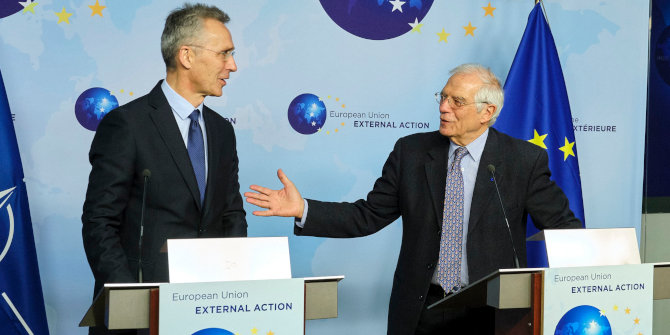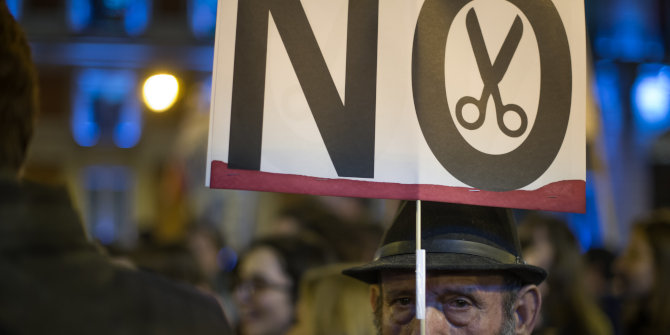 Marine Le Pen secured a far higher share of the vote in the second round of the French presidential election than her father, Jean-Marie Le Pen, managed in 2002. But as David Lees writes, Marine may soon come under pressure from within her own party, with many of her followers sceptical about the nature of her campaign.
Marine Le Pen secured a far higher share of the vote in the second round of the French presidential election than her father, Jean-Marie Le Pen, managed in 2002. But as David Lees writes, Marine may soon come under pressure from within her own party, with many of her followers sceptical about the nature of her campaign.
Emmanuel Macron won convincingly in the final round of the presidential elections in France. Few can dispute that Macron – who obtained at least 65 per cent of the vote – now has a significant mandate to lead France for the next five years. As many commentators and indeed politicians have pointed out, the real difficulty will now be to form a government. Faced with the prospect of the centre-right winning a landslide victory in June’s legislative elections, Macron is working hard to establish ‘En Marche!’ candidates across the country to try to win a majority in parliament for his own movement. In reality, this will prove difficult, since local députés are well-established in their constituencies and there is likely to be a tendency in those polls to reject the legacy of the unpopular Hollande administration.
In many ways, though, Macron will not find it hard to work with, or indeed cohabit with, the centre-right. Large parts of his economic policies are closer to François Fillon’s desire to strip down the French state and encourage companies to hire and fire with ease, than they are to the concerns of many Socialist voters. Although much is being made of Macron’s victory as a sign that the traditional parties are dead, the reality is less clear-cut. Macron is part of the establishment, despite campaigning, and winning, on an independent ticket. As a product of the École Normale d’Administration (ENA) and a former investment banker, Macron hails from a broadly comparable social circle to many figures in the Républicains party who may well form part of Macron’s administration.
Macron’s victory was clearly met with relief by people across France and the western world. The blaring of car horns late into the Parisian night was a demonstration of unity against Marine Le Pen. Yet the so-called ‘Republican front’ did not hold completely fast. Le Pen increased her share of the vote from the first-round far more on this occasion than her father managed in 2002. Votes have clearly come to Le Pen from the centre-right and perhaps even from supporters of the far-left Jean-Luc Mélenchon, who failed to endorse either candidate.
One of the strangest features of the result is the way in which the high (35%) rate of abstention favoured Macron, not Le Pen. There will be some within the Front National who will argue that, had Marine performed better in the head-to-head debate, and even if the FN candidate had not been Marine, then this abstention may have swept a Le Pen to power. In many ways, the conditions could not have been more favourable to Marine Le Pen: terrorist attacks carried out by French-born radical Islamists have mounted since 2012, there is widespread unemployment and Le Pen was surfing on a wave of anti-establishment politics which began with Brexit and continued with the election of Donald Trump.
Le Pen failed to win partly because her campaign simply was not good enough – she thrived only when dealing with the traditional issues of the Front National and abandoning some of the more softly-softly approaches of the party – and because of her catastrophic decision in the debate to taunt Macron rather than be very clear on how her policies around immigration and national identity could end home-grown terrorism. Torn between one approach (that of ongoing ‘cleansing’ of the Front National’s image) and the traditional identity of the party, Le Pen failed to appeal sufficiently to either centre-right or extreme-left voters.
While Marine and her team will seek to learn the lessons of this failed effort in 2017, and will approach the legislative elections in June with a view to becoming the party of the opposition, some in the party will no doubt be planning any future moves. Marine is most likely to be the FN’s candidate for 2022, seen by many in the party as the target election, but she would do well to remember her family’s history of political scheming and keep one eye on the intelligent, highly persuasive Marion Maréchal Le Pen – even after the latter’s decision to step down from politics (for now). All is not lost for the Front National, but if Marine does not focus either on maintaining the cleansing of the party or reverting back to its traditional image, then the party may well feel its future lies with another member of the Le Pen family.
Please read our comments policy before commenting.
Note: This article gives the views of the author, and not the position of EUROPP – European Politics and Policy, nor of the London School of Economics.
_________________________________
 David Lees – University of Warwick
David Lees – University of Warwick
David Lees is a Teaching Fellow in French Studies at the University of Warwick.





